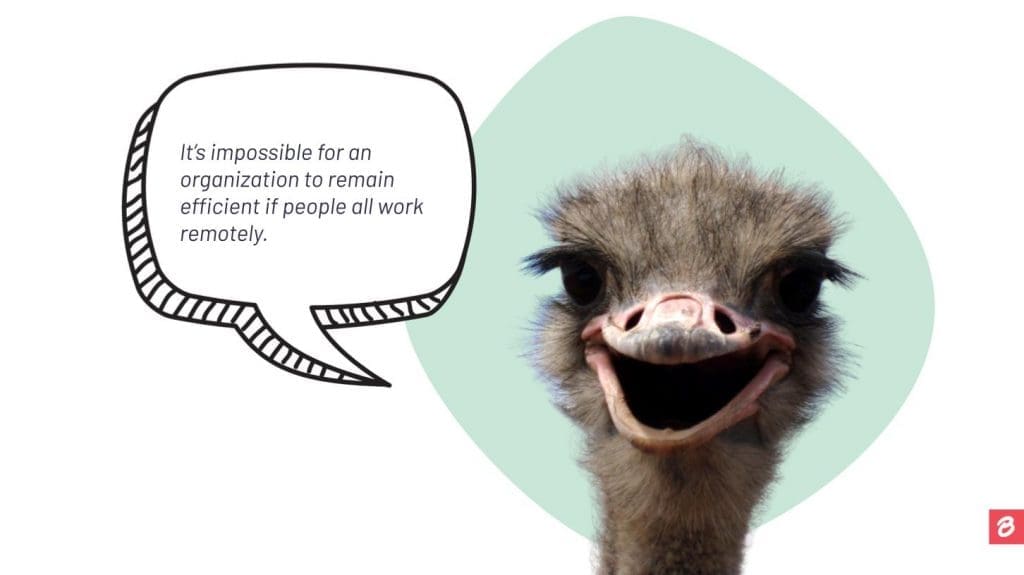
20 October 2023
4 min.
Remote and Hybrid work
13 July 2021
6 min.

The return to work in hybrid mode raises many questions for managers and employees alike.
However, we also have preconceived notions, beliefs that can be limiting. These beliefs slow us down in transitions like the one we are about to experience. To successfully go back to the office, we must learn to deconstruct and challenge them in order to be in a state of mind that is favorable to change — a growth mindset.
The biggest obstacle to this growth mindset is… ourselves. So, we went through the exercise of identifying some of the beliefs that can really get in the way. And, we’ve also thought about how to transform them in order to ease the transition back to the office.

It takes a clear guideline for people to know where, when, and how to work because it’s easier. You have to avoid unclear options and give people guidelines.
The reality is that there will be many gray areas and many ambiguities because we don’t know what we don’t know yet. Even though we are trying to anticipate everything right now, there will be surprises and discoveries along the way.
We have to be prepared for these surprises and take action as we find a solution. We can no longer wait for someone to tell us what to do and when to do it. We have to be proactive and empower ourselves: “I can take action.”
For example, do you realize that with the return to in-person work, your team has stopped taking notes during meetings in your shared document? Say so! And suggest continuing or adapting how your team used to take their meeting notes during the pandemic: in turns, one person assigned, divided, etc.
Giving choices is complicated! Not only is it complicated to manage, but it’s also difficult to explain, to organize… “It’s absolutely necessary that everyone be sitting at their desk from 9 till 5, it’s easier that way.”
We are all very different people. We want different things, learn in different ways, and have different goals. How can we expect that by giving one rule, one method, one schedule, or one way of working, people will be satisfied and productive?
We have different contexts (both personal and professional), different roles, different tasks. We have experienced remote work. Thus, we know in which context it’s appropriate and in which it’s not. You can be autonomous and choose what is best for you.
“I have a choice, so I have control over the situation, regardless of my position.” For example, you can choose where you work based on the types of tasks you have and your personal reality. All within the team standards you’ve set for yourself.
With this in mind, team standards can become real guidelines for channeling autonomy and providing common reference points. Similarly, be sure to let others make their own choices, even if you would have made different ones.
Even in a hybrid mode, it’s still my same job and there won’t really be any change.
Changes have already taken place and the world will not be completely the same. Many companies and organizations have recognized the benefits of remote work and it is likely that many will continue to do so. Likewise, some people will make the choice to keep working remotely on a partial or permanent basis.
Although the changes that are coming for you may be minor, or perhaps of lesser importance than those you have already experienced, pay attention to them so that you can better address them when the time comes.
Hybrid mode really won’t be easy, it’s going to be a lot to adjust to again. “I have to endure.”
We managed to get through a year of this pandemic. We are about to experience (more) important changes. We can decide to learn from the destabilization rather than endure it this time. Especially since we are certainly more resilient than before!
Learn willingly and make efforts to develop new skills.
I don’t trust that everyone will respect their commitments, for example with more flexible working hours.
Did you really experience this at the beginning of the pandemic? In many cases, people worked harder. In fact, it was worrisome at times; you may have experienced it yourself.
“I use my strengths and those of my colleagues.” The more people can choose how they approach a task, the more they will want to complete it successfully and in a high-quality manner. An important meeting is taking place and it would be really relevant if everyone was there in person? Trust everyone’s judgment. If they know it’s important, they will make sure they are there.
We don’t need psychological proximity anymore! Now that we’re back in the office, we don’t need to make as much effort towards our colleagues and collaborators.
Psychological proximity is a daily effort and it applies as much to a team working remotely as it does in hybrid or 100% in-person mode. It is not because the physical distance is smaller that the psychological distance is necessarily smaller.
Continue to listen to your colleagues and make efforts to get closer to them. After all, isn’t it more fun to work with people you feel close to?
As you can see, a simple mindset shift can make all the difference and make transitions more agile and enjoyable for everyone. It’s possible to thrive in remote work as well as in hybrid mode when you give yourself the means to do so.
Blog

20 October 2023
4 min.

16 August 2022
3 min.

2 August 2022
3 min.